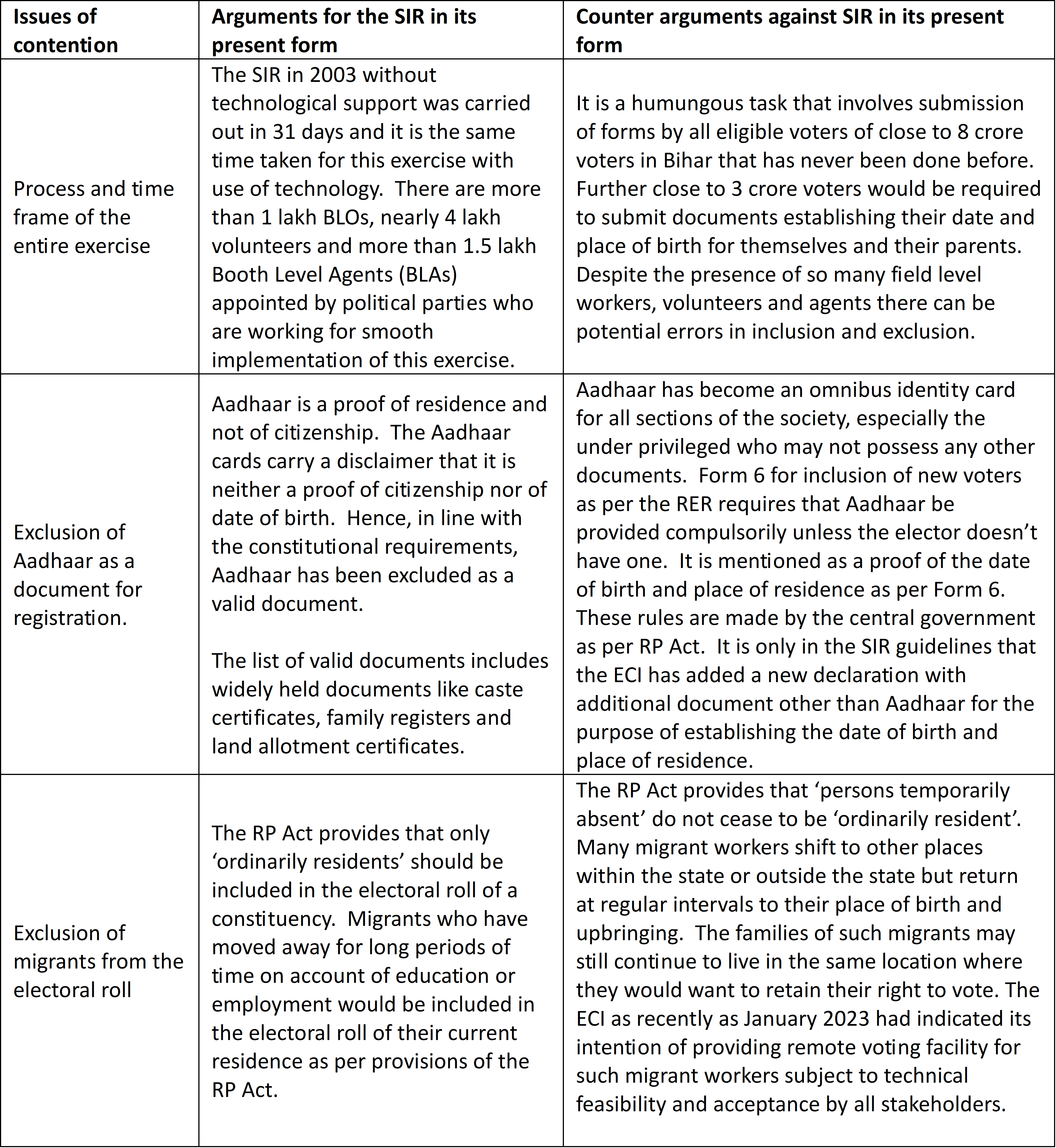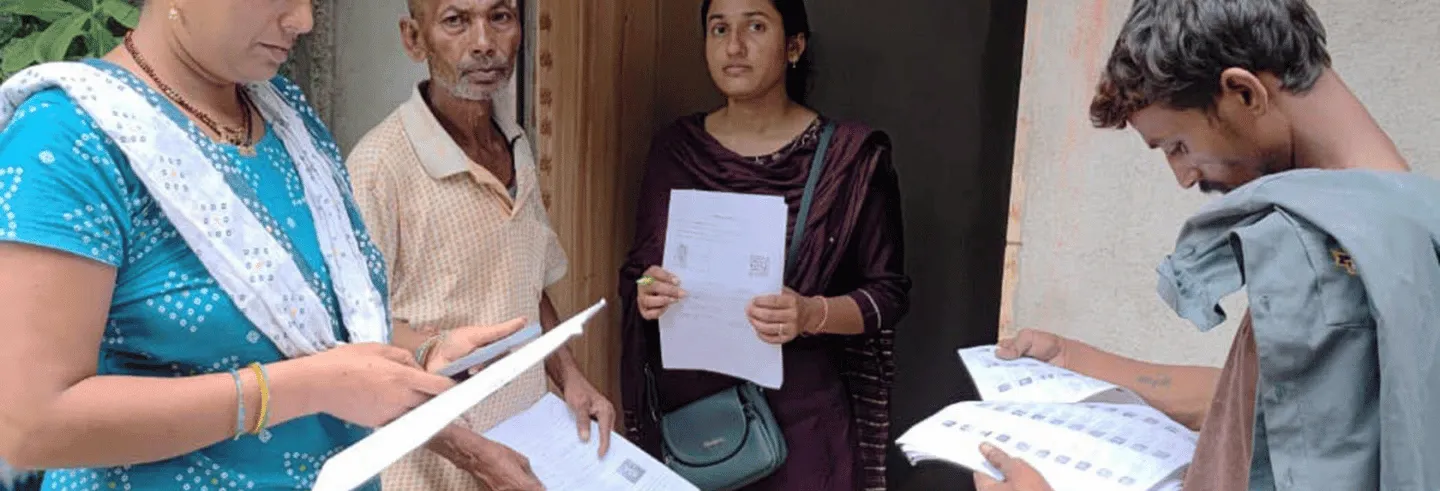Introduction
The Election Commission of India (ECI) has initiated a Special Intensive Revision (SIR) of the electoral rolls in Bihar before the general elections for its legislative assembly. The SIR would involve a thorough revision of the electoral roll from scratch by the ECI. The exercise commenced on 25 June 2025 with the distribution of enumeration forms to all the 8 crore voters in the electoral roll of Bihar. It will conclude with the publication of the revised final electoral roll by September 30, 2025.
What is the Electoral Roll?
Article 324 of the Constitution provides that the superintendence, direction and control of the preparation of electoral rolls for the conduct of elections to Parliament and the state legislature shall vest with the ECI. Article 326 provides that every citizen who is not less than 18 years of age shall be entitled to be registered as a voter (elector).
The electoral rolls are prepared by the ECI as per the provisions of the Representation of the People Act, 1950 (RP Act). The rolls are prepared for every assembly constituency separately and the Lok Sabha constituency roll shall consist of the rolls of assembly constituency segments in the parliamentary constituency. There shall be for each State a Chief Electoral Officer (CEO); for each district a District Election Officer (DEO); for each assembly constituency an Electoral Registration Officer (ERO) and Assistant EROs to assist the ERO. These officers are designated or nominated by the ECI in consultation with the state governments. In addition, Booth Level Officers (BLO) are designated for the purpose of preparation, updating and revision of electoral rolls.
Section 16 of the RP Act disqualifies a non-citizen from being enrolled in the electoral roll. Section 19 provides two additional conditions for being registered in the electoral roll – (a) is not less than 18 years of age on the qualifying date which are the 1st days of January, April, July and October of the year; and (b) is ordinarily resident in a constituency.
Section 20 of the RP Act provides the meaning of the term ‘ordinarily resident’. It specifies that a person shall not be deemed to be ‘ordinarily resident’ in a constituency only on the ground of owning or possessing a dwelling house therein. However, a person temporarily absent from his place of ‘ordinary residence’ shall continue to be ‘ordinarily resident’ therein.
Persons who are –
(a) members of armed forces of the Union;
(b) armed police force of a state serving outside that State;
(c) employed by Government of India in a post outside India or
(d) holding a constitutional office declared by the President in consultation with the EC like President, Vice-President, Governor of a State, Ministers in Union or State council of ministers,
are considered, along with their spouse, to be ‘ordinarily resident’ in the constituency where they would have been ‘ordinarily resident’ but for such posting.
Section 20A was added in 2010 to enable Non-Resident Indians who have shifted out of India, even for the long-term on account of education, employment or otherwise, to register and vote in the constituency in which their address according to their passport is located.
What and Why of SIR?
Section 21 of the RP Act deals with preparation and revision of electoral rolls. A summary revision is carried out before each general election to the Lok Sabha or legislative assembly of a State or bye-election to any constituency. It also authorises the ECI to carry out special revision of the electoral roll at any time for reasons to be recorded.
The commission has noted in its order dated June 24, 2025 that there have been large-scale additions and deletions to the electoral rolls over the last 20 years due to rapid urbanisation and migration. This has increased the possibility of duplicate entries in the electoral roll. The commission is also constitutionally obligated to ensure that only citizens are enrolled in the electoral rolls. Accordingly, the ECI has decided to carry out a Special Intensive Revision (SIR) for the entire country.
The last such SIR was carried out for Bihar in 2003. Since elections to the Bihar assembly are due in November 2025, it has laid down the guidelines for SIR of the Bihar Electoral Roll (BER) with the qualifying date as 1st July 2025. In the last SIR, the enumerators were sent for house-to-house verification with a copy of details containing the existing voters. However, in the present SIR, every existing elector will have to submit an enumeration form to the BLO. For electors registered in the electoral roll as of January 2003 (basis of the last SIR), no further documents are required to be submitted except the extract of the electoral roll of 2003. In respect of electors registered after January 2003, they have to additionally submit documents for establishing the date and place of birth for themselves and their parent(s) as required. The schedule for the current SIR is as in Table 1.
Table 1: Schedule for SIR in Bihar

A further appeal with the District Magistrate (within 15 days of publication of final electoral roll) and from his/her order with the CEO (within 30 days) is possible under the provisions of the Registration of Electors Rules, 1960(RER).
What are the pros and cons of the SIR?
There have been arguments for and against the SIR made by various stakeholders that needs a detailed analysis. These arguments are summarised in Table 2.
Table 2: Pros and Cons of Bihar SIR

Special Emphasis on Migrant Labourers
The requirement of being ‘ordinarily resident’ for inclusion in the electoral roll of a constituency is to ensure that the voter maintains real ties with the constituency that preserves representative accountability. It is also aimed at preventing fraudulent registrations.
The Gauhati High Court in the Manmohan Singh case (1999), indicated that the term ‘ordinarily resident’ shall mean a habitual resident of that place. It must be permanent in character and not temporary or casual. It must be a place where the person has the intention to dwell permanently. A reasonable man must accept him/her as a resident of that place.
The removal of migrant voters from the electoral roll of their original residence by following a strict interpretation of the term ‘ordinarily resident’ can vitiate the democratic process.
The Periodic Labour Force Survey of 2020-21 estimated that around 11% of the population migrated due to employment related reasons. This translates to close to 15 crore voters being migrant labour within or outside their states of birth. Some of these migrations are seasonal in nature where the labourers return to their ordinary residence for some months of a year. Many migrant construction and security workers live in temporary shacks/residences at their place of work. They move from one location to another, within a state or even in different states, as part of their work. They return to the ordinary residence in their home state at regular intervals. They exercise their right to vote in that place where their families and children live and where their properties exist. While they may not be residing permanently in such a residence, the philosophy behind being ‘ordinarily resident’ as opined by the courts is broadly fulfilled with respect to that residence for such migrant workers.
The removal of migrant voters from the electoral roll of their original residence by following a strict interpretation of the term ‘ordinarily resident’ can vitiate the democratic process. It may result in their disenfranchisement as most of them would not be keen to nor welcome, to register as voters in their temporary place of work.
Issues surrounding Verification of Citizenship
One other issue that has been raised by the petitioners against the SIR in the Supreme Court is that this process is turning out to be a mechanism of verifying the citizenship of individuals by the ECI.
According to the Constitution and provisions of the RP Act, it is only citizens who are entitled to vote in an election in India. However, the requirement to submit proof of date and place of birth of not just the voters but also their parents, for persons enrolled after 2003, is a herculean task not just for the voters but also for the BLOs and EROs who need to verify them. The ECI is not the authority under law to establish the citizenship of any person; this lies with the home ministry. The task of verifying the documents in such a short span to establish the citizenship of voters enrolled after 2003, roughly around 3 crore voters, is of gigantic proportions.
The ECI is not the authority under law to establish the citizenship of any person…
While non-citizens need to be excluded from the roll, eligible citizens should not be wrongfully excluded due to non-submission of valid documents. Till now, the ECI has relied on Aadhar and self-declaration for enrolment of new voters. Rule 8 of the 1960 RER states that when the ERO, for the purpose of preparation of electoral roll requests information from the dwellers in a constituency, such persons shall furnish information called for therein to the best of their ability.
What can be the way forward?
To provide a legal analogy, inclusion of an ineligible name in the electoral roll is like a guilty person going scot-free, while exclusion of an eligible voter is akin to one innocent suffering. While incorrect exclusion that deprives a citizen the right to vote is more grave than incorrect inclusion, both aspects vitiate the democratic process and should be checked. Hence, the issues raised around the SIR in its present form need to be suitably addressed.
Firstly, the proposed timelines for completion of such a mammoth exercise are stretched. The ECI should ensure that adequate safeguards are put in place for completion without errors. The BLAs appointed by political parties should act as a watchdog against errors of omission or commission.
Secondly, exclusion of Aadhaar from the list of valid documents can create issues for many persons, especially the underprivileged. Considering the ground realities at the end of the enumeration phase, the ECI should tailor its process to ensure that no eligible citizen is left out due to their inability to produce any of the documents from the list of valid documents. The Supreme Court in its interim observation on the SIR process on July 10, 2025 has also asked the ECI to consider documents like Aadhar, the Ration Card and Voter ID for the purpose of the exercise if the voters are unable to submit any document from the list of valid documents.
…At the end of the enumeration phase, the ECI should tailor its process to ensure that no eligible citizen is left out due to their inability to produce any of the documents from the list of valid documents.
Finally, migrant workers should not be removed from the rolls; this can result in significant deletions against the wishes of such voters. Such migrants have exercised their right to vote in the place of their choice and should continue to do so. If required, the RP Act or RER should be amended by Parliament to preserve this choice of migrant workers. Suitable mechanisms including remote voting, acceptable to all stakeholders, to enable participation of migrant labourers in the elections should be explored. The issue of migrants enrolling more than once in different constituencies should be addressed separately through Aadhaar seeding.
The views expressed here are personal.
Rangarajan R is a former IAS officer and author of ‘Courseware on Polity Simplified’. He currently trains candidates at the Officers IAS Academy.









